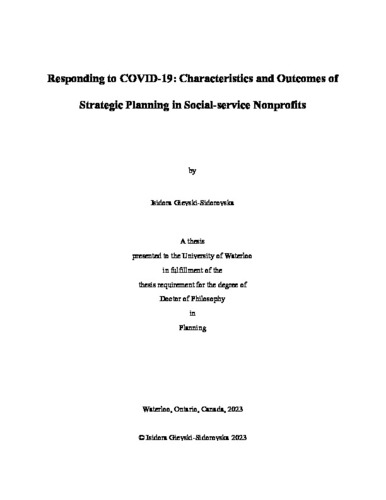| dc.description.abstract | Forty years after its initial introduction in the nonprofit space (Bryson, 1988; Bryson & Roering, 1987; Nutt & Backoff, 1987), the value of formal strategic planning still remains disputed and lacking an appropriate recognition. While the implementation of formal planning in nonprofits has been related to greater rates of survival, growth and access to resources (Bielefeld, 1993; Hwang & Bromley, 2015; Stone et al., 1999), strategic planning in the sector remains far from ubiquitous, with empirical evidence suggesting that less than 50% of nonprofits engage in formal strategizing (Hwang & Bromley, 2015; Stone et al., 1999). Key concerns include the relevance of formal planning for the specific needs of the nonprofit organization, questions about whether the effectiveness and efficiency acquired by its implementation will also lead to mission drift and lessened social impact (Guo, 2006; Suykens et al., 2019), and the difficulties and challenges related to its application, especially the usefulness of formal plans for environments that constantly change (Hwang & Bromley, 2015).
This dissertation takes a broad look at the value and benefits of planning processes in the sector, specifically by examining the significance, outcomes, and feasibility of formal strategic planning in the nonprofit organization. The analysis is based on three key contributions: (1) a theoretical review of the specific vulnerabilities deriving from the nonprofit character and the relevance of established strategic planning functions to address such challenges; (2) an examination of the proximal, first-order outcomes of the planning process and their contribution to the long-term resilience and growth of these organizations; and (3) a study of effective planning models in turbulence, and the rationale for their application in the nonprofit environment.
This dissertation builds an argument that strategic planning holds special value for nonprofits, not despite but rather due to particularities of the nonprofit character. It draws on the strategy-as-process and complexity scholarship to point out the various ways in which strategic planning can act as a resource for the sector in an attempt to move the conversation from whether nonprofits should use strategic planning, to the kinds of planning practices and models that hold greatest potential for the management of these organizations. | en |

